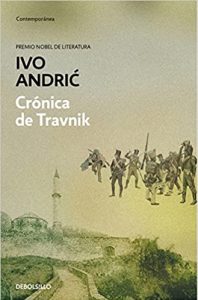The passage of time locates Ivo Andric in that limbo stateless due to his condition as a Yugoslav for most of his life and until his end. However, in that natural decant according to experiences and wishes, Ivo was more inclined to the Serbian imagination.
A decanted always full of meaning for followers and detractors changing in these conditions according to the appropriate nationalist label. Andrić ended up being a Serbian reference and, therefore, vilified by Bosnians and Croats for a long time (you see, in the end hatred can also unite bad avenues ...)
Political rolls aside, Andrić is considered the best of the storytellers of that Balkan area around the world (for ending up with the controversial flags and sticking to the roots of the terroir). And it is true that their historical novels They have that symbolic and metaphorical point that always reveals very vivid explanations of the great paradoxes and contradictions of nations, homelands, nationalisms, championed passions and promoted xenophobias...
Top 3 Recommended Novels by Ivo Andrić
A bridge over the Drina
When Ken follett He undertook the task of undertaking the most extensive of his novels "A World Without End", the idea of the Kingsbridge bridge served as the perfect metaphor for that diverse symbology between union and life course. But the idea had already come from afar ... Because in this other masterful novel, Ivo pointed to the bridge as a meaning of transcendence of the human in the face of the very misery of the human condition.
The city of Visegrad (Bosnia), located on the banks of the Drina River, had a moment of splendor in the Middle Ages for constituting a bridge of transit between the Christian and Islamic world.
This novel collects the history of this plural and conflictive community, taking as a narrative pretext the great stone bridge that crosses the river, a meeting place and walk for its inhabitants. The long chronicle covers from the XNUMXth century to the beginning of the XNUMXth, and tells us of the tensions and confrontations that follow one another and are inherited from generation to generation.
Sum of small particular stories that constitute the history of a community of communities, the former Yugoslavia, this narrative explains the roots of hatred and violence of the eternal impossible community.
Travnik Chronicle
In the case of this Yugoslav writer, the paradigm of the complexity of returning to the places where he was happy acquires a shocking complexity. That is why Ivo Andric only half returns to Travnik to get closer to a historical novel that has a lot of seeds of everything that was, and still is, the complex area of the Austro-Hungarian Empire.
We are at the height of the Napoleonic wars. A French diplomat, Jean Daville, is sent to Travnik, a small town lost in the mountains of Bosnia, as consul.
The novel is the story of his stay there between 1806 and 1814, giving us the opportunity to offer us a fresco of that troubled time in which the Balkans were opening up to the West for the first time. Around the small town, where the Austrian consul has also settled, Napoleonic politics are written with fire and blood while the two consuls, lost in the small territory of Bosnia, will see their ambitions and youth shipwreck and suffocate in the middle. of an archaic, contradictory and impenetrable community.
A human landscape in which images of an almost medieval world intersect with the unease of European women and with the daily lives of the involuntary actors in the little story: merchants, bureaucrats, artisans, peasants.
On the border between the historical novel, the intimate story and the ethnographic description, this novel by the author of A Bridge over the Drina constitutes one of the best evidences that the novel continues to be a genre that is as alive as it is essential.
Miss
The most particular of the novels that the author focused on his Balkans. The two previous plots had a strong historical component from which to compose the narrative framework. This time everything happens from the inside out, from the character to the context. Different, more powerful at times although perhaps with less prism on the general symbology of the narrative effort to map the future of a shattered empire.
The action begins in 1900 in Sarajevo, where the heroine of the novel spends a happy childhood with her father, a wealthy Serbian merchant who is her only center of worship. Their businesses go bankrupt, and already on his deathbed, the father makes the 15-year-old promise to take responsibility for the house instead of her mother.
Rajka's entire life will be governed by this oath. Miss is a study in character. As if it were a classic comedy, the character's personality and behavior are predetermined by a single dominant obsession: greed. Constructed like a circular novel, this work delves into historical details, while treating human loneliness in a stark and breathtaking style.



